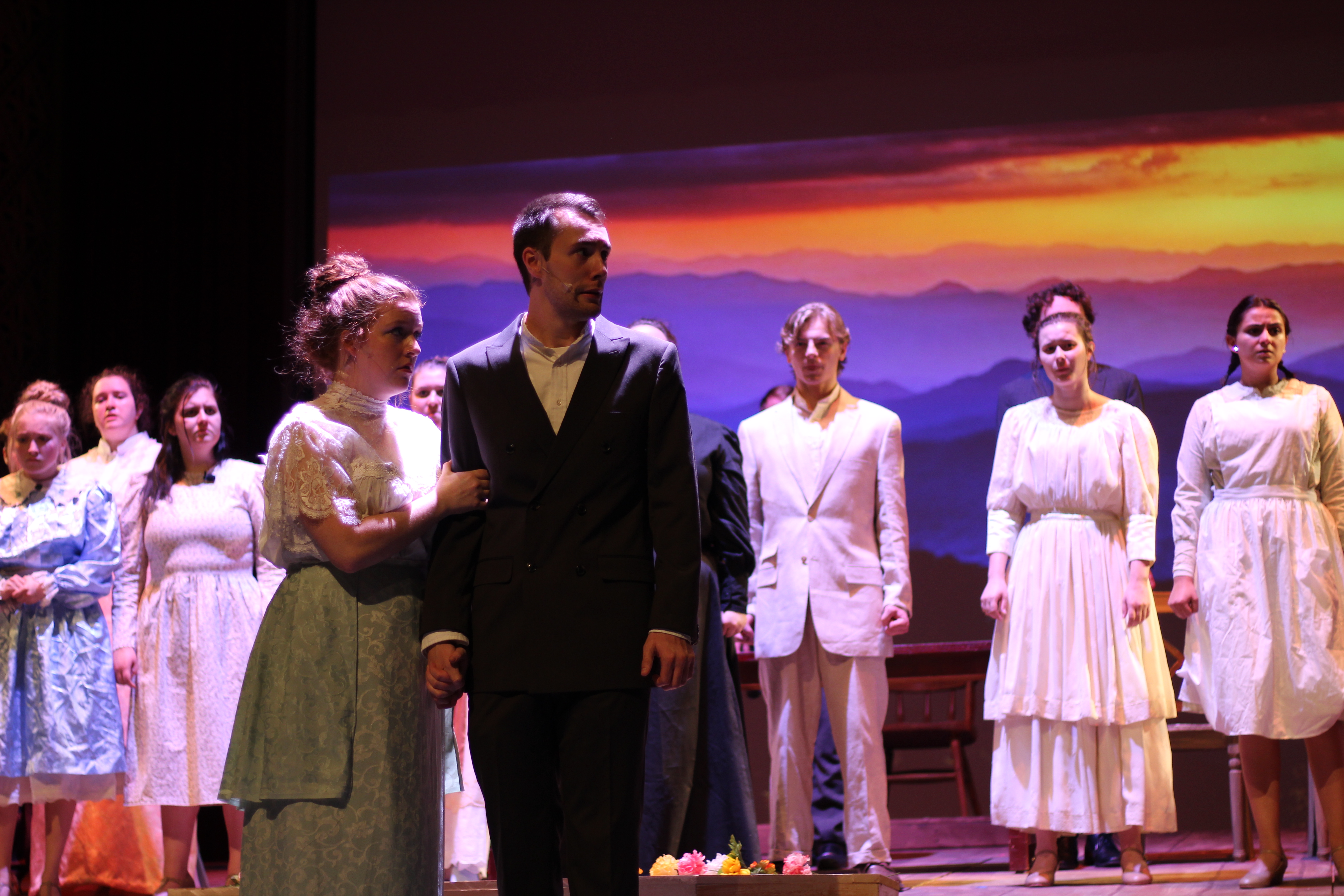Students in the musical theater program are preparing for this weekend’s opening of Parade in Mees Hall, the first musical of the school year.

The play is based on the true story of Leo Frank, a Jewish man from New York who is accused of murdering a young girl in Atlanta, Georgia in 1913. As the situation develops, the story becomes a “flashpoint for every American problem: classism, sexism, anti-semitism, racism, etc.,” said Joshua Borths, interim director of opera and musical theater at the university and stage director of the production.
Borths said he realizes that the show will spark a discussion, but that he isn’t nervous to open the production to the public because it’s a show that he and the rest of the cast and crew believe in.
“One of the reasons [this musical] is so compelling is because it’s such a perfect storm of issues: race, anti-semitism, child labor, class distinction, north-south … and that seems relevant,” he said.
The cast and crew have been working on this production since the beginning of the school year, and for many students this is one of the first times they’ve worked on a production with such serious subject matter.
“I think it’s very important for us as a department on a university campus to produce works that are worth talking about and aren’t just feel good,” Borths said.
The scale of the show has also been a large undertaking for the cast and crew, Borths explained. While the play is definitely “monumental” emotionally, there is also a large number of characters and an “incredibly complex” Tony-award winning score, he said.
Although the play involves dark subject matter, Borths said the show has some heartfelt moments with a unique love story.
“It’s very easy when you read the description to think that this is only going to be a depressing show, and it’s not … there is a great relationship that is developed between Leo and Lucille that goes on a journey unlike any that I know in any piece of theater,” Borths said.
Colleen Shannon, a senior vocal education major, plays the role of Lucille Frank, Leo’s wife, and said their love story is one of her favorite parts of the show.
“I think something about this love story is that it’s just very real,” said . “There’s a lot of uncomfortable and awkward moments, but it makes it like real people you know.”
Noah Ott, a senior vocal education major, plays the role of Leo Frank, a Jewish man and native of New York City who moves to Atlanta, Georgia and is eventually accused of the murder of a young girl.

Ott said this role has been challenging because it’s his first time working on a “real drama” and having to work with a character that sometimes does things that he doesn’t agree with.
“With any acting, you just kind of have to take the character for who they are and to think about what they want, what their motivation is, and to live that regardless of whether you agree with it or not,” Ott said. “ … You kind of have to give the characters the voice that they deserve.”
Parade is also a new experience for the students because it’s based on a true story with characters that were real people, which Ott describes as “a blessing and a curse.” In preparation for the roles, Shannon and Ott said they did a lot of research about the case from watching documentaries to reading books and old news articles and testimonies from the trial.
“It’s restricting kind of to have a real, physical human model for a character, but it’s also very freeing in a way to be able to read the actual news articles that were written about Leo and to look at pictures of him and to see him in these really difficult places in his life based on first-hand accounts,” Ott said.
For Shannon, knowing that the musical is based on a real story has made it difficult to leave on the stage.
“Usually it’s so nice at the end of the day when you’re in a show to think ‘well, at least it’s not a true story,’ but it’s real,” Shannon said. “You have to distance yourself a little bit from it in the process of rehearsing so you don’t just cry all the time.”
Parade will take the stage in Mees Hall Auditorium this weekend, Friday Oct. 25 and Saturday Oct. 26, with both shows starting at 7:30 p.m. Tickets are free for students, faculty, and staff with a current Capital ID and are $20 for those without an ID.
“Our goal in the way that we stage the end is to leave you with questions, to engage and to lean forward, and I think that’s a worthy thing to do on a Friday night,” Borths said.















